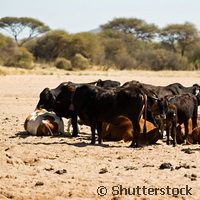Better understanding of diseases devastating African communities
While high-profile diseases such as malaria and tuberculosis tend to take the lion's share of both publicity and funding, a number of neglected diseases, transmissible between animals and humans (zoonoses), continue to devastate communities in Africa, Asia and Latin America. A team of international scientists is tackling this problem from all angles, in Africa: prevention, diagnosis, understanding and awareness. The EU-funded project ICONZ ('Integrated control of neglected zoonoses: improving human health and animal production through scientific innovation and public engagement') is looking at the impact of eight diseases: anthrax, rabies, brucellosis, bovine TB, zoonotic trypanosomiasis, echinococcosis, cysticercosis and leishmaniasis. These diseases pose a direct risk to human health, and can also have a serious impact on livestock productivity - and hence the livelihoods of the poor. The project is expected to have a major impact by helping developing countries implement effective zoonosis controls and for increasing awareness of the problems they cause. The team is developing new practical, cost-effective and sustainable strategies for keeping the diseases in check. After mapping and reviewing previous research into the eight diseases, the team built a unique database, able to provide detailed information on location, scope and type of research currently being carried out for these eight key neglected zoonoses. They also created an inventory of all diagnostic tools for each of the neglected zoonoses. Key work was done on assessing neglected zoonoses in communities in Mali, Morocco, Mozambique, Nigeria, Tanzania, Uganda and Zambia. This involved livestock keepers, householders, patients, medical and veterinary service personnel and other key individuals. Four types of strategies are under development, addressing different types of neglected zoonoses: bacterial ones; diseases affecting dogs and small ruminants; those affecting pigs; and vector-borne zoonoses. The team is also looking at cultural attitudes and practices, gender issues and traditional knowledge. As a doctor would make a medical diagnosis before recommending a treatment plan, the ICONZ team intends to make an educational diagnosis before proposing an intervention plan. ICONZ has identified an overwhelming need for capacity building in the seven African countries. While all institutions surveyed had carried out training in one or more of the neglected zoonoses in the past five years, and have the facilities to host and train students, more support is needed. Most institutions had also focused more on veterinary medicine than human health. The project along with another EU-funded project, OH-NEXTGEN, will help by transferring knowledge to African researchers. The project has also identified a need for more women researchers and policy makers in the African partner countries. In several of the areas where pilot projects or case studies are being carried out, local women's groups have been invited to help design and run them, and to determine the most appropriate methods for communication and publicity. ICONZ's results and those of another related project on advocacy for neglected zoonoses, ADVANZ, will be available to national governments so that they may develop policies and secure commitment at national level. Participation by all stakeholders, including government, district officials, traditional and religious authorities should ensure a major impact is achieved, and each community's unique requirements are supported. The project is coordinated by the University of Edinburgh, and received around EUR 6 million in EU funding. It began in 2009 and will end in 2014.For more information, please visit: ICONZ http://www.iconzafrica.org Project factsheet OH-NEXTGEN http://www.oh-nextgen.eu/ ADVANZ http://www.advanz.org/
Countries
Morocco, Mali, Mozambique, Nigeria, Tanzania, Uganda, United Kingdom, Zambia



